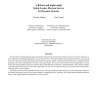47 search results - page 1 / 10 » Controlling Candidate-Sequential Elections |
135
click to vote
CORR
2012
Springer
13 years 9 months ago
2012
Springer
All previous work on “candidate-control” manipulation of elections has been in the model of full-information, simultaneous voting. This is a problem, since in quite a few real...
104
click to vote
CORR
2010
Springer
15 years 2 months ago
2010
Springer
-- Electing leader is a vital issue not only in distributed computing but also in communication network [1, 2, 3, 4, 5], centralized mutual exclusion algorithm [6, 7], centralized ...
102
click to vote
IJCAI
2007
15 years 3 months ago
2007
Electoral control refers to attempts by an election’s organizer (“the chair”) to influence the outcome by adding/deleting/partitioning voters or candidates. The groundbreak...
113
click to vote
DSN
2008
IEEE
15 years 8 months ago
2008
IEEE
We describe the implementation and experimental evaluation of a fault-tolerant leader election service for dynamic systems. Intuitively, distributed applications can use this serv...
CORR
2010
Springer
15 years 2 months ago
2010
Springer
In 1992, Bartholdi, Tovey, and Trick [1992] opened the study of control attacks on elections--attempts to improve the election outcome by such actions as adding/deleting candidate...

